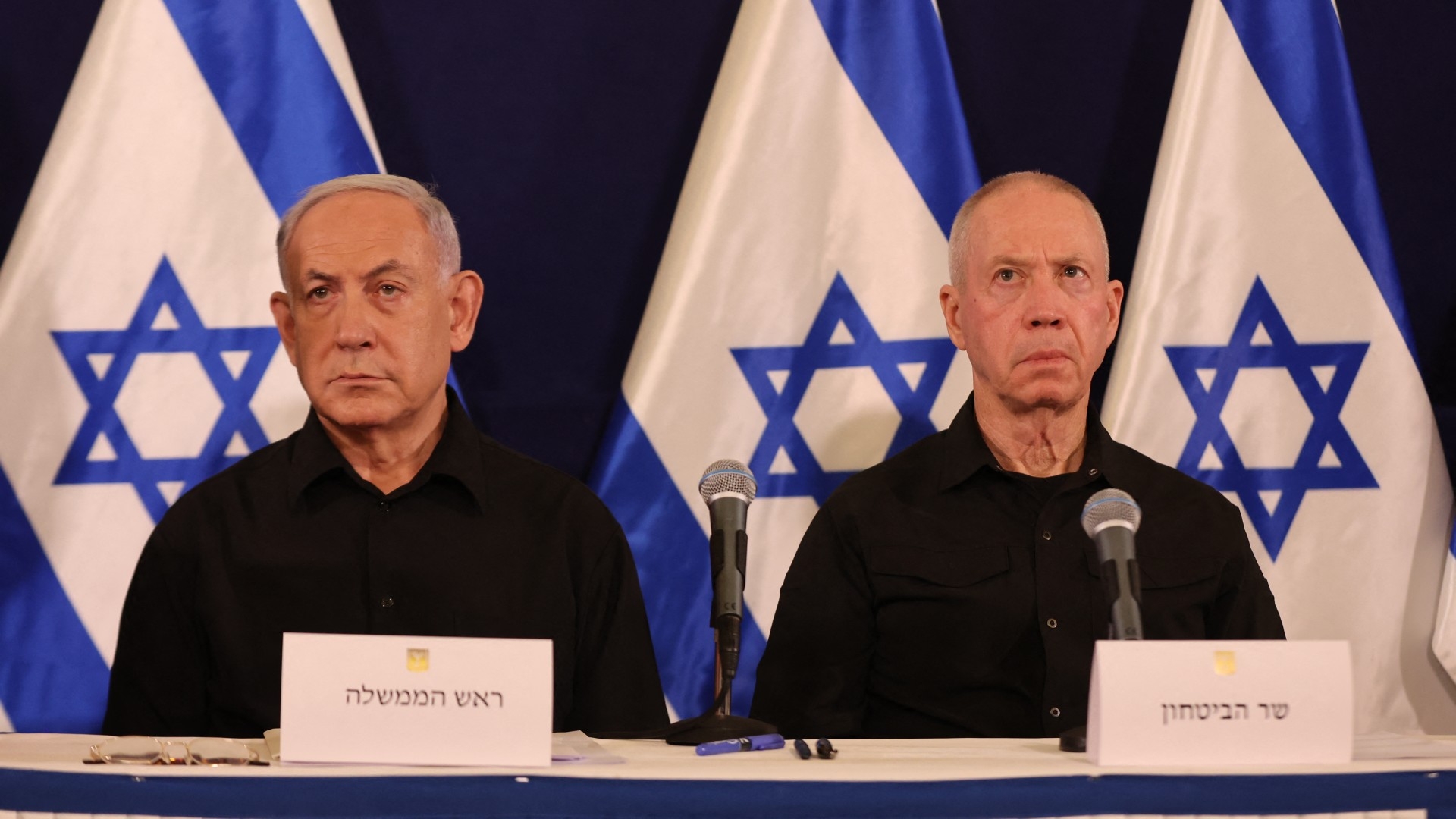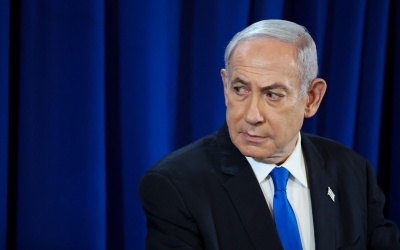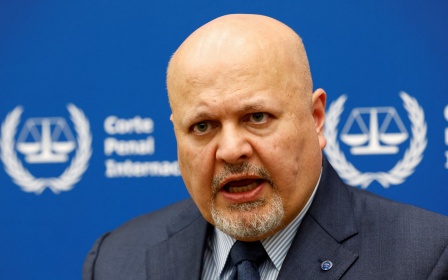Are Netanyahu and Gallant immune from ICC arrest warrants under international law?

Israeli Prime Minister Benjamin Netanyahu and his former defence minister, Yoav Gallant, are now fugitives under international law, after the International Criminal Court issued arrest warrants for them on Thursday.
All 124 state parties to the Rome Statute, including all EU members, are now under a legal obligation to arrest the pair.
The fact that they belong to a state that is not party to the treaty, however, may be used to invoke immunity, experts told Middle East Eye.
The arrest warrants are part of a war-crimes investigation on the situation in Palestine, launched in 2021 by the former ICC prosecutor.
Israel is not a member of the ICC, but the State of Palestine was granted membership in 2015. Accordingly, the court can investigate Israeli individuals for crimes committed in occupied Palestine, which includes the Gaza Strip, the West Bank and East Jerusalem.
New MEE newsletter: Jerusalem Dispatch
Sign up to get the latest insights and analysis on Israel-Palestine, alongside Turkey Unpacked and other MEE newsletters
A trial cannot commence in absentia and member states must hand the accused over to the court in The Hague.
But the court does not have enforcement powers. It relies on the cooperation of member states to arrest and surrender suspects.
In order to protect themselves against arrest, it is expected that Netanyahu and Gallant, in addition to other Israelis who may be subject to future warrants, may bring an immunity defence before national courts or the ICC. But legal experts say their case will be easy to dismiss.
Additionally, state parties to the Rome Statute may take advantage of loopholes in the treaty to refuse to arrest and surrender Netanyahu, as was the case with states that failed to arrest Sudan’s Omar al-Bashir or Russia’s Vladimir Putin, both wanted by the court.
“An immunity defence will undoubtedly be mounted,” Leila Sadat, an international criminal law professor and former ICC advisor on crimes against humanity, told Middle East Eye.
But the court’s statute and its previous judgments have confirmed that a head of state or government under an arrest warrant has no immunity, even if they belong to a non-state party.
Below, Middle East Eye unpacks immunity rules under the ICC statute and international law generally, and whether they may protect Netanyahu, Gallant or other Israeli state officials from prosecution.
What types of immunity exist under international law?
There is no treaty enshrining immunity rules under international law, but such rules can be derived from state practice, court judgements and scholarly opinion.
A state official facing charges of serious international crimes like war crimes, crimes against humanity and genocide can invoke two types of immunity before national or international courts.
First, they may claim that they are entitled to functional immunity, which permanently shields them from prosecution for acts carried out in their official capacity as state actors.
This protection, theoretically, applies during and after they leave office. However, the international criminal law jurisprudence that followed World War II has introduced an exception to this rule in relation to serious international crimes.
The Nuremberg trials, the ad hoc tribunals of the former Yugoslavia and Rwanda, as well as the Rome Statute have permanently challenged the rationale for this type of immunity by enshrining the concept of individual criminal responsibility and the irrelevance of official capacity in cases of allegations of international crimes.
This also appears to be the position of the International Law Commission, the UN’s main body of experts tasked with the development and codification of international law.
The second type of immunity, known as personal immunity, is more controversial and might be used by states either to refuse to arrest and surrender Israeli leaders to the ICC or protect them from prosecution before their national courts.
Personal immunity protects heads of state and senior officials, as well as diplomats, from prosecution during their time in office in order to preserve the smooth functioning of international relations and the officials' unhindered ability to perform their duties, including the representation of their state internationally.
There are laws around the world that enshrine personal immunity for diplomats on a mission and for serving state officials, mainly the head of state, prime minister and minister of foreign affairs. They apply when the officials are present on the territory of another state in an official capacity.
'The heads of states do not enjoy immunity before the ICC, period, irrespective of whether they belong to state parties or also to non-party states'
- Giulia Pinzauti, international law professor Leiden university
In the case of Netanyahu, such immunity may protect him when he travels to states that are not party to the Rome Statute if these states have universal jurisdiction on international crimes, such as the United States.
Universal jurisdiction is a legal principle that allows a state to prosecute people for serious international crimes, regardless of where the crime was committed or the nationality of the victim or perpetrator.
The above types of immunity, however, are widely understood to be inapplicable in the case of an arrest warrant issued by the ICC. This is because it is uncontroversial that state officials of all ranks have no immunity before an international court with jurisdiction, such as the ICC.
It is the raison d’etre of the Rome Statute to hold individuals accountable for the four crimes under its jurisdiction - genocide, war crimes, crimes against humanity and aggression - without regard to their official capacity as state officials or leaders.
But there are obstacles and loopholes that might arise in the case of nationals of states that are not party to the ICC, such as Netanyahu, as explained below.
Is Netanyahu immune under the Rome Statute?
The rules on immunity are stipulated in Articles 27 and 98 of the Rome Statute.
Article 27 clearly states that all wanted persons are equal before the court, including heads of a state or government. No immunities under international law may bar the court from exercising its jurisdiction, it adds.
The main loophole in the statute, however, is a provision in Article 98 (1) that introduces an exception to Article 27 in relation to the arrest and surrender of officials from states that are not members of the ICC, such as Israel.
It stipulates that the court may not request the arrest of a non-ICC country's official if that would force a member of the ICC to act inconsistently with its international law obligations on immunity.
“On the face of it, this rule would apply to Nethanyahu, who enjoys immunities under international law as head of government of Israel,” said Paola Gaeta, a professor of international law and expert on immunities.
However, Israel could choose to surrender Netanyahu to the ICC, though that appears extremely unlikely.
The immunity rule does not apply to Gallant, who is no longer in office, as former state officials do not enjoy the same immunities as serving officials. Netanyahu would similarly no longer be entitled to any immunity for international crimes after leaving office.
How have ICC members flouted their obligations to arrest state leaders?
Article 98 (1) has been used in the past by states that refused to hand over Bashir and Putin, who are nationals of states not party to the ICC.
For example, Jordan triggered Article 98 (1) when it did not arrest Bashir on 29 March 2017, and Mongolia refused to arrest Putin when he visited the country on 3 September 2024, saying he enjoys both functional and personal immunity.
But the ICC in the two cases rejected the immunity plea as unfounded. Last month, the court ruled that Mongolia had violated the Rome Statute by failing to arrest Putin.
In explaining its rationale, the court said the article “refers only to acts of government activities which are typically conducted abroad and are protected by the safeguards on diplomatic immunity for certain officials and buildings”.
It added that the reference to state immunity under article 98 (1) is related to the immunity of a state and its property, not its leaders or officials.
“It is reasonable to expect the pre-trial chamber to take a similar position with regard to Netanyahu and Gallant,” said William Schabas, an international criminal law professor.
On the other hand, Gaeta explained that when the ICC rejected the claim of Jordan and other states that refused to arrest Bashir, it did so on the basis that the United Nations Security Council had referred the situation in Sudan's Darfur to the court. Such referral, the court held, prevailed over Article 98 (1).
“This argument is not available to the case of Nethanyau, since the jurisdiction of the court over the crimes in Gaza was not triggered by the Security Council,” said Gaeta.
However, the court also said that immunities for officials of non-ICC member states did not apply in Bashir's case, seemingly contradicting the provision in Article 98 (1) and causing further confusion.
'The case of Netanyau will reopen the debate that was apparently settled in the case of [Sudan's Omar] Bashir'
- Paola Gaeta, Geneva Institute
“In the end, I guess that the case of Netanyau will reopen the debate that was apparently settled in the case of Bashir,” Gaeta said.
Giulia Pinzauti, an international law professor at Leiden university, noted that Mongolia has sought to appeal the ICC’s decision on its non-compliance.
“We haven't had a final word on this,” said Pinzauti. “On the other hand, you also have statements like the one by the Dutch foreign minister that stated that the Netherlands will arrest the suspects if they enter Dutch soil,” she added.
“So this is a very important statement for state practice. It reinforces the view that is gaining ground among states. The heads of states do not enjoy immunity before the ICC period, irrespective of whether they belong to state parties or also to non-party states.”
If states do not comply with the court’s request for arrest, their conduct will be referred to the Assembly of States Parties, the governing body of the ICC, as was the case with Mongolia.
Then the assembly can take measures to induce cooperation.
Middle East Eye delivers independent and unrivalled coverage and analysis of the Middle East, North Africa and beyond. To learn more about republishing this content and the associated fees, please fill out this form. More about MEE can be found here.








